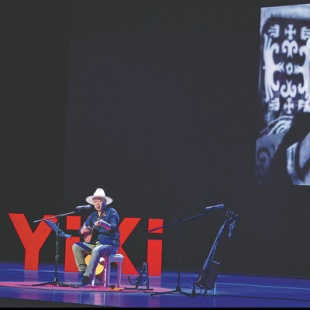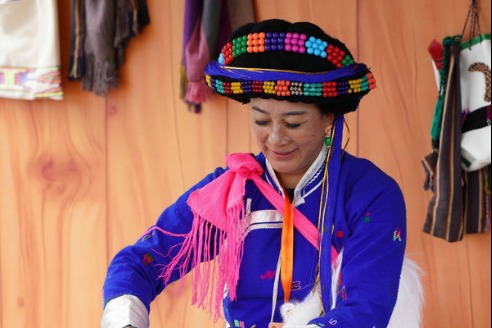Singer knows country roads take him home


The town he loves so well still inspires, as does the majesty of Xinjiang's landscapes, Chen Nan reports.
Yiqikelike in Kuqa in the Xinjiang Uygur autonomous region was once a thriving oil town. Meaning "a place where gazelles appear" in Uygur, and hidden deep in the Tianshan Mountains, Yiqikelike was once home to thousands of people who labored night and day to extract the treasure buried beneath its streets.
Zhang Zhi was born and raised in the oil town, where his parents worked. He can still recall vividly that it was covered in snow in the winter, and, as a child, he spent his days sledding with his elder brother and the other neighborhood children.
"I spent my childhood there. I think it is the most beautiful place in the world, and I still think so," the 50-year-old says.
He grew up being exposed to the cultures of the many ethnic groups that live in the area, absorbing their music and learning to play their instruments.
His dream was to become an artist and, while he did learn to paint as a child, he later became a singer-songwriter, dedicated to writing folk songs incorporating the musical elements of Xinjiang. In 2010, he joined the band Voyagers as lead vocalist and songwriter.
During a recent online event, Zhang shared stories about life in Yiqikelike and how it inspired him to create his music, which has been enthusiastically welcomed by fans.

Along with two other band members, Jin Mei, who plays the yangqin (a hammered dulcimer), and Mongolian ethnic musician Gawa, who plays the morin khuur (the horse-head fiddle), Zhang performed one of his most famous songs, Yiqikelike, which he wrote in honor of his hometown.
He says that he wrote it after he took a dombra (a two-stringed plucked instrument) to play in a valley on the outskirts of Xinjiang's Karamay city.
As the notes from his dombra mingled with the sound of the wind, he was inspired to write the song, which is about his parents, who moved from Sichuan province to work in the oilfields.
"When they came here, they were young. When they left, they were gray-haired. The song is also dedicated to all those others, just like my parents, who worked and lived there," he says.





































